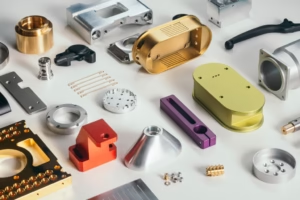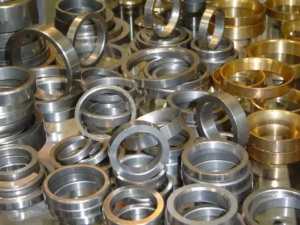Secteur industriel
Prototek is a leading provider of advanced manufacturing services, including CNC machining, metal forging, casting, deep drawing, and cold extrusion. These technologies are essential in the industrial sector, where precision, reliability, and efficiency are paramount. This article explores how Prototek’s expertise in these areas supports the development and production of high-quality industrial components and machinery.
CNC Machining in the Industrial Sector
——CNC (Computer Numerical Control) machining involves the use of computer-controlled machines to manufacture parts with high precision. This process ensures the production of complex shapes and designs with remarkable accuracy and consistency.
Applications in Industrial Manufacturing
- Machine Parts: CNC machining is important for producing precise and durable parts for industrial machinery, such as gears, shafts, and bearings.
- Tooling Components: CNC machining creates custom tooling components, including molds and dies, with high accuracy to ensure proper fit and function.
- Automation Equipment: High-precision CNC machining is used to manufacture components for automation equipment, ensuring reliability and performance.
- Hydraulic Components: CNC machining produces intricate components for hydraulic systems, ensuring reliability and efficiency.

Metal Forging in the Industrial Sector

——Metal forging involves shaping metal using localized compressive forces. This process can be performed at various temperatures, including hot forging and cold forging, depending on the material and desired properties.
Applications in Industrial Manufacturing
- Heavy Machinery Components: Forged components for heavy machinery, such as construction equipment and agricultural machinery, offer superior strength and durability.
- Tooling and Dies: Forged tooling and dies provide enhanced mechanical properties and longevity, essential for industrial applications.
- Piping and Fittings: Forged piping and fittings ensure robust performance and reliability in industrial piping systems.
Metal Casting in the Industrial Sector
——Metal casting involves pouring molten metal into a mold to create parts with complex shapes. Various casting methods, such as sand, precision, and die, are used based on the application and material requirements.
Applications in Industrial Manufacturing
- Machinery Housings: Casting is ideal for producing complex machinery housings with intricate shapes.
- Pump and Valve Bodies: Cast pump and valve bodies provide the necessary strength and precision for reliable operation.
- Industrial Equipment Components: Cast components for industrial equipment, such as compressors and turbines, offer excellent performance and durability.

Deep Drawing in the Industrial Sector

——Deep drawing is a metal forming process that involves pulling a sheet metal blank into a forming die to create a hollow shape. This method is ideal for producing seamless, thin-walled components.
Applications in Industrial Manufacturing
- Enclosures and Housings: Deep drawing produces seamless enclosures and housings for industrial equipment, ensuring robust protection and durability.
- Containers and Tanks: Deep-drawn containers and tanks provide secure and reliable storage for industrial materials.
- Electrical Components: Deep drawing creates precise and durable casings for electrical components, ensuring protection and reliability.
Cold Extrusion in the Industrial Sector
Cold extrusion is a metal-forming process that involves forcing a metal billet through a die to create a specific shape at room temperature. This method produces high-precision, high-strength components with excellent surface finish.
Applications in Industrial Manufacturing
- Fasteners and Connectors: The fasteners and connectors manufactured by cold extrusion have high strength and excellent mechanical properties and can produce parts with precise dimensions and complex shapes, ensuring good fit and connection.
- Shafts and Rods: It can produce high-precision shafts and rods. The manufactured shafts and rods have smooth surfaces and no burrs and have excellent material strength and wear resistance.
- Electrical Contacts: The manufactured electrical contacts have good electrical conductivity, and corrosion resistance, and are suitable for various harsh environments. Ensure that the electrical contacts are in stable contact and are not prone to failure or malfunction.

Integrated Applications and Innovations

–By integrating CNC machining, metal forging, casting, deep drawing, and cold extrusion, Prototek can enhance product quality, streamline production processes, and reduce costs. This comprehensive approach ensures that each industrial component meets the highest standards of performance and reliability.
Innovative Applications
- Advanced Materials: Prototek uses advanced materials and manufacturing techniques to produce high-performance components, ensuring the efficiency and longevity of produced parts.
- Customized Solutions: Providing solutions tailored to the specific needs of industrial manufacturers, from rapid prototyping to full production.
- High-Performance Components: Leverage the strengths of each manufacturing method to produce high-performance parts for critical industrial applications.
Why Choose Prototek
Close collaboration between Prototek’s design and manufacturing departments ensures that each component moves smoothly from concept to production.
Prototek is a one-stop solution platform from prototyping, R&D to mass production. Utilizing our instant quoting platform and comprehensive supplier network, you can quickly obtain design validation and accelerate your product launch.
Production capacity
Industry certifications including ISO 9001, IATF16949
Strict quality control
Provide professional quality inspection report
Instant quote online
The online order page provides different parameters and processes to get a quote quickly

Let's Connect
- Lynnyao@prototekparts.com
- +86-0792-86372550
F.A.Q.
In the industrial field, it is widely used to manufacture high-precision parts such as components, tools, and molds, and is used in various industrial fields such as aerospace, automobiles, electronics, and medical.
It has the advantages of high precision, high efficiency and strong repeatability, and can realize the processing of complex parts and improve production efficiency and product quality.
The operator is required to have good basic knowledge of mechanical processing, CNC programming ability, and understand material properties and processing technology to ensure accurate processing results.
It can realize automated production and mass production, reduce human errors, improve processing accuracy and consistency, and thus improve production efficiency.
CNC machining technology will continue to develop. The application of technologies such as five-axis machining and high-speed machining will further improve machining efficiency and precision, and meet the industrial field's demand for high-quality parts.
























































